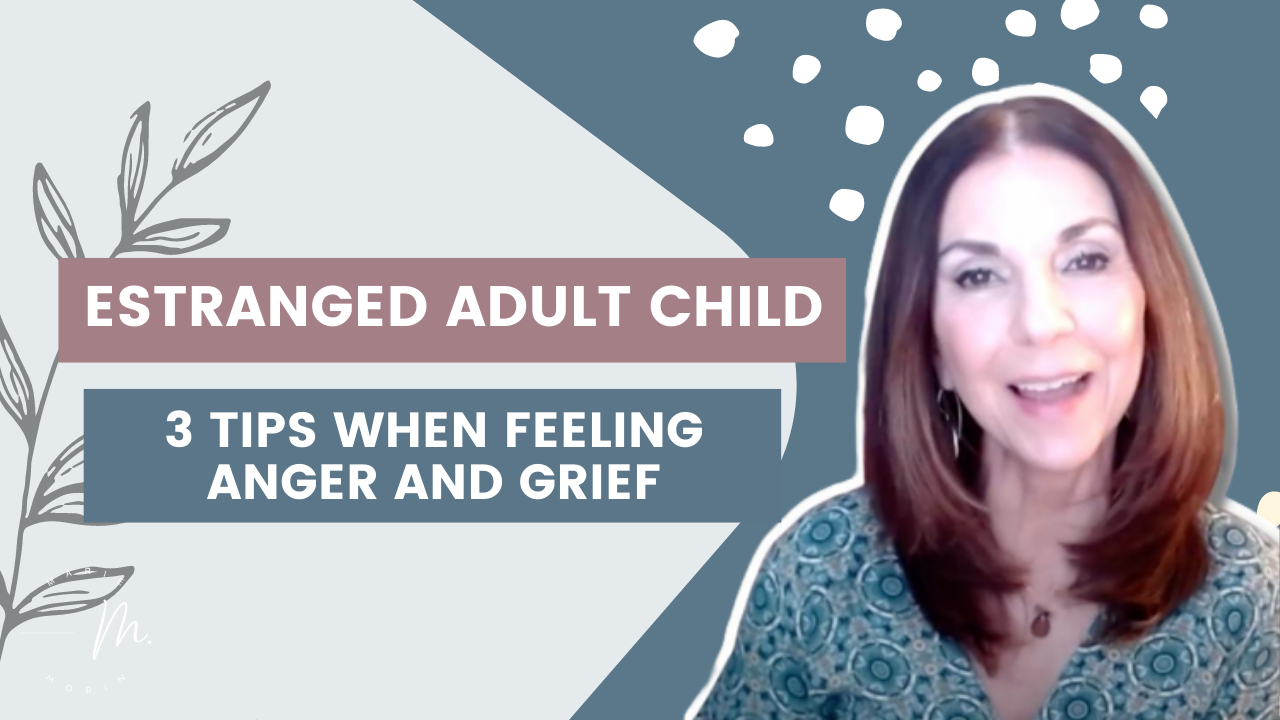Estrangement from an adult child can feel like an assault. Being cut-off can elicit feelings like you have been “stabbed in the heart,” “crushed,” and “torn apart.” The condition is ambiguous; unlike death, the loved one chooses to cut off, and there is no definite endpoint. Grieving is a natural response to loss, with denial, bargaining, anger, depression, and acceptance as part of the process. Experiencing anger over your adult child’s cut-off can come in waves or be long-standing. This article discusses Feeling Anger and Grief When You Are Estranged From Your Adult Children Three Tips.
More than twenty-seven percent of the United States population are emotionally or physically separated from one or more family members. Many refrain from sharing their grief. They remain quiet due to the stigma of being rejected by a child and thoughts of what others may think. The estrangement condition is so painful and worse when in grief and alone.
Bargaining, depression, acceptance, denial, and anger are normal feelings of grieving when you are cut off from an adult child.
Anger
The loss of a loved one can cause one to be angry at their loved one or themselves. Anger is a method of expressing powerful emotions such as fear and deep sadness. Anger can also protect one from feeling sadness and, in some way, serve as a distraction from more uncomfortable feelings.
Anger elicits physiological sensations such as racing heart rate and breathing. It responds to the perception of being disrespected, rejected, neglected, and degraded. Stress, rage, and frustration are part of angry feelings. Strong feelings can be so overwhelming that feelings one can be left feeling guilty.
Estrangement can cause anxiety about what will happen with the relationship with your adult child. Compounding the loss and feelings of anger are the emotions that are often behind the anger. Sadness and fear over the status of the relationship, and when will it improve? Will there be reconciliation?
Parents who desire reconciliation may find themselves so triggered by emotions that their behaviors may work against the goal of seeing their adult child again. Learning to move through the grieving process and feelings will help prepare parents to move forward. Estrangement is ambiguous. There are many uncertainties that parents will deal with throughout the condition. Questions of when they will see their adult child, how they will repair the relationship, and if they will ever reconcile can be very stressful.
Three Tips To Deal With Anger When Grieving For Your Adult Child
- Emotional Visit
Emotional visits require careful compassionate appointments to explore and return to your courage to move forward. Journaling can be part of these visits with simple writing. There is no right or wrong way. Just let it flow. Handwritten journaling is best, so you slow down, think, and feel. Using your computer will work too. The idea is to pause so you can express and process. Think of it as an opportunity for intimacy where you accept what you feel and allow it to be.
Recognize that anger is a normal emotion that needs attention. Allow yourself to identify what angers you; letting yourself feel until there is some relief and returning to your usual activity is key to processing. Release may come in the form of crying or punching a pillow. When we process our feelings, the grip they have reduces. We become less likely to react when we are keenly aware of our emotions and process them. This way, you prepare for possible future meetings with your adult child. You will also be more likely to better self-regulate when emotions trigger you.
- Get Support
Talking to a friend who loves and values you are critical. The grieving process naturally evolves into depression. You may feel less apt to be around others since the loss of your child so terribly pains you. Resist the temptation to isolate. Socializing and being with others is an antidote to more intense grieving feelings.
- Be Compassionate With Yourself
When grieving, feelings of anger, sadness, fear, depression, and guilt can be extraordinarily challenging. Anger is the outward expression of internal turmoil that can focus inward. Parents who lose their adult children to estrangement already suffer enormously.
To move forward no matter what your goal will require self-compassion. Self-compassion will allow you to better care for yourself. You will be more likely to respond to others and less likely to react. Self-compassion is treating yourself as you would a dear friend.
Self-kindness helps us be gentle and brings us closer to our most intimate relationship. We can accept our imperfections and mistakes when stressful experiences come up, and we know they always will. Self-compassion also helps us to understand others better. When we are in tune with compassion, it is easier to process hurts resulting from others. This awareness will be helpful if and when you and your adult child move towards reconciling.
Stages of Grief
Shock
Shock is the overwhelming natural pain, sadness and feeling horrified. If it is unexpected, it is undoubtedly more confounding. Feeling shocked can include confusion, emotional paralysis, and numbness.
Denial
Denial is a means to protect oneself from the enormity of strong feelings.
One can minimize it and profess that it did not occur to avoid the intensity of the loss.
When grieving, denial allows time to pass to grapple with the reality of the loss.
Anger
The loss of a loved one can cause one to be angry at their loved one or themselves. Anger is a method of expressing powerful emotions such as fear and deep sadness. Anger can also protect one from feeling sadness and, in some way, serve as a distraction from more uncomfortable feelings.
Bargaining
Loss and grief can cause one to feel out of control. One might resort to bargaining with a higher power to gain control. One might make promises or deal with a higher power to others or themselves in hopes of getting the outcome they want.
Depression
It is natural to feel deep sadness when one experiences loss when estranged. Deep sadness can occur as the reality of the loss becomes more evident. Clinical depression includes hopelessness, avoidance of socializing, preferring seclusion, and withdrawal. Sometimes thoughts such as “I don’t think I can do this” or “what is the point?” may preoccupy one’s time. Depression impacts one’s ability to function the same way before the loss. It is imperative to seek professional help when one is depressed and has lost motivation to act, do self-care, and do other usual daily activities. Also, if you experience any suicidal thoughts, please seek professional help.
Guilt
Feelings of guilt can arise from sensations of relief. If the relationship was strained and challenging, there might be relief from ceasing high-tension behaviors. Also, one may feel guilty about words and deeds before the estrangement. One may feel guilty about opportunities missed as well.
Acceptance
Acceptance is not resisting the reality of the loss and that one will have a different life for a while. When there is estrangement, acceptance is not about accepting you are resigned to never seeing your family again as in death but accepting the current loss of the relationship status. Kylie Agllias, the author of the remarkable book Family Estrangement A Matter of Perspective, describes how acceptance is a mindful decision to move forward, continue to live, and reframe how one thinks about estrangement. Agllias encourages one to behave differently and focus more on caring for oneself.
Grieving over the loss of an estranged loved one can be heartbreaking. However, as in death, the survivors consciously try to remember their loved ones and live again. While it looks different, life continues. It is not an easy task, but possible.
The cost of loving others is the certainty of losing them through death; as humans, we manage to pick up the pieces and hopefully move forward. When one is estranged, as, in the experience of death, there is still hope that the estranged relationship will change and improve.
During this waiting period, moving forward includes resuming ordinary life and intentional nourishing practices. Estrangement from an adult child can feel like an assault. Being cut-off can elicit feelings like you have been “stabbed in the heart,” “crushed,” and “torn apart.” The condition is ambiguous, unlike death, since the person is alive and there is no definite endpoint. Grieving is a natural response to loss, with denial, bargaining, anger, depression, and acceptance as part of the process. Experiencing anger over your adult child’s cut-off can come in waves or be long-standing.
This article discusses Feeling Anger and Grief When You Are Estranged From Your Adult Children Three Tips.









